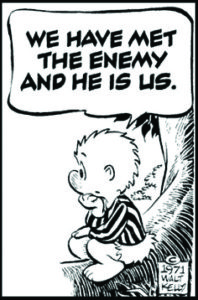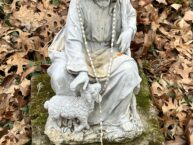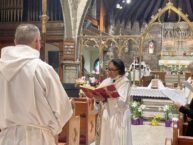 July 23, 2017: May God’s words alone be spoken, may God’s words alone be heard. Amen.
July 23, 2017: May God’s words alone be spoken, may God’s words alone be heard. Amen.
Well, isn’t THAT just a fun gospel passage.
Jesus tells the crowds – you know, those same folks from last week, another parable (actually – he tells a few more, but our lectionary cuts them out and makes us wait until next week’s episode on the Jesus Channel). Anyway, this one is about seed for wheat being planted, and then while nobody was looking, weeds were sowed in the same area. Now, I think Jesus was talking about my garden, because I swear, every time I get the garden cleared of weeds they magically appear with a vengeance. But anyway – Jesus’ parable continues, and he says that the farm workers went to the landowner to question whether the seed that he planted was really all that good in the first place (that’s a whole other sermon right there), and then to suggest they get working on those weeds. The landowner told them to just chill. Leave the weeds right where they are. Now, I like this, because it is EXACTLY my gardening philosophy.
Then later back at the house, the disciples asked Jesus about this particular parable – not the ones we hear about next week that he also told the crowds – just this one. Apparently mustard seeds, baking, and things like that are a bit easier to get our heads around than weeds that are to be left alone. Whatever. So, Jesus says – “look – it will all get worked out in the end…in a really horrific way, but hey – don’t worry, be happy.” What?
Now the problem with all of that (besides the weeping and gnashing of teeth – what is up with that!) – is that we have really messed up what Jesus is getting at here, and become a lot like those eager beaver farmhands. We have turned this parable into a “we are good – they (whoever they may be) are bad” story.
Maybe it would help us to use the King James version of this, in which the word weed was instead tares. Tares, or darnel, was a weed that grew among grain, intertwining its roots. It looked identical to wheat until near the harvest, when both produce seed. At that time, the tares stand more upright, while the wheat bends. It is still plentiful in the middle East, and it is also poisonous, making any bread produced from it taste very sour. “Roman law prohibited sowing darnel among the wheat of an enemy,[3][4] suggesting that the scenario presented here is realistic.”[1]
So, how does thinking about tares make this parable more understandable? Because if this is about tares, and it is, then the parable is pointing to a larger truth than we might get at if the weeds were very distinct from the wheat. See, the thing is, we have often turned this parable into a metaphor for good vs. evil, and the judgement of one over and against another – as though they could be separated – as though some people are all good, and others are all bad.
We also have turned this judgement thing into a post-death escalator ride – you know, some folks going up, others going down. It can make folks look at death like some sort of audit by the IRS, which reminds me of something about WC Fields, the late comic actor. Just before his death, a friend visited Fields’ hospital room and was surprised to find him thumbing through a Bible. Asked what he was doing with a Bible, Fields replied, “I’m looking for loopholes.”
This is not about a cosmic thumbs up or thumbs down by God on each of us as some post-death measure of purity and perfection. If it were – we’d all fail. Good and evil, like the wheat and tares, can’t be separated – not in the field, and not in us – that was the point of the parable. If we go around looking for the enemies, we just might be surprised by where we find them. It is like this quote by that fabulous comic creation of Walt Kelly, the opossum Pogo. Pogo lived a tree in the steamy Okefenokee swamp. And in one famous comic strip from the 1970’s, Pogo was with another of the swamp denizens lamenting all the trash thrown by humans into their habitat, and said, “We have met the enemy and he is us.”
Life, and perhaps the afterlife, is just not that black and white; and, while the author of this gospel may have looked at things in this dualistic way, I don’t think God does. The thing is, darkness and light are in all of us. That is what Jesus was telling us. If we try to rip out the evil, we destroy the good. The struggle is living with the tension of that in us, and around us, and what we do in the context of that – that is the parable of the wheat and the weeds. In other words – what do we do with the crap that crops up around us in our life – how do we respond to it.
We are being challenged in this parable to consider where in our lives have we been like the farmhands – pointing out what we believe is bad, and rather than praying – conversing with God about what to do – pronouncing judgement and then trying to rip the life out of those people….oh, sorry, pull up the weeds. Yet, if we looked down at ourselves a bit more closely, we might find that we are not the pure wheat we thought we were. If we are to judge, then it must begin with ourselves.
But Jesus isn’t asking us to do that – in fact, he is imploring us to leave judgement in the hands of God. And that is a good thing, because whenever we have tried to judge another as being good, or worthy, or whatever…we almost always get it wrong. It is like the old story about a bishop on a trip. “Bishop Potter was sailing for Europe on one of the great transatlantic ocean liners back before taking cruises was popular. When he went on board, he found that another passenger was to share the cabin with him. After going to see the accommodations, he came up to the purser’s desk and inquired if he could leave his gold watch and other valuables in the ship’s safe. He explained that ordinarily he never availed himself of that privilege, but he had been to his cabin and had met the man who was to occupy the other berth. Judging from his appearance, he was afraid that he might not be a very trustworthy person. The purser accepted the responsibility for the valuables and remarked, “It’s all right, bishop, I’ll be very glad to take care of them for you. The other man has been up here and left his for the same reason!”
You see, it is not within our grasp to tell wheat from weed, and when we do, we ourselves are as poisonous as any tare may be – to others, and to ourselves. And the reality is – we are both wheat and tare! There is no such thing as a weed-less person! So for us to point fingers, we would have to start with the person in the mirror (and note – it is seldom that we start there). Judging others puts us out of step with Christ – the one who called us to love our neighbor as ourselves. To love one another as he loved us. It also is a misunderstanding of who all of humanity is in relationship with God.
Now, to be clear, this does not mean we turn a blind eye to injustice, poverty, and violence in our world. Not at all. It means that when we are confronted with evil like we heard on the news this morning – where 8 are dead and another 30 are in critical condition after being trapped in a trailer in Texas in over 100 degree heat – victims of human trafficking – our brothers and sisters suffering in the hands of ruthless human smugglers – when we hear that, it means that we respond as Jesus would – standing up for the voiceless, overturning the tables of an unjust world, ministering to those in need. Pointing fingers, issuing our own condemnation, that doesn’t accomplish as much as working to change how it all happened in the first place – stopping the ones who would spread the bad seed, or better – creating a world where that thought would never cross the person’s mind or heart. Because the world is filled with a whole bunch of weedy people – us included – and yet God is hoping we are able to grow into our fullest wheaty potential – perhaps by discovering who we are – because it is the only way to really change the world for the better.
And, you know who really understood this? St. Paul. In the part of his letter to the Romans today, Paul writes “For all who are led by the Spirit of God are children of God. For you did not receive a spirit of slavery to fall back into fear, but you have received a spirit of adoption. When we cry, “Abba! Father!” it is that very Spirit bearing witness with our spirit that we are children of God, and if children, then heirs, heirs of God and joint heirs with Christ.”
Did you catch that – joint heirs with Christ!
Now here’s the really crazy thing – God knows that we are both wheat and weed, good and bad, darkness and light. And if anyone can attest to that – it is Paul. He persecuted the early followers of Jesus, sanctioning the execution of St. Stephen, and was one of the most judgmental (okay, he might argue zealous) people in the early Jesus movement. He knew he was deeply flawed, writing about it often. And yet, here he is saying that we are all the children of God – co-inheritors with God’s child, Jesus.
He is saying that our spirit understands this relationship even if we do not – yearning for that connection with that which is greater than ourselves. St. Paul is talking about the cry of the seeker, and all of the world is filled with seekers. Many of us know and understand that longing.
All of us find our own way – seeking, questioning, yearning for something we know deep down is a part of who we are. And when we are able to hear in our souls the great “I love you” of God, we bear witness to that love in the way that resonates in our heart – that is why there are so many ways to understand God, to be in relationship with our Creator. And whichever way we come to understand who we are, the answer from God is always the same – that we are deeply loved – unconditionally loved – children and heirs of this Kin-dom in which all people are welcome – no matter how weedy we have become.
The parable of the wheat and the tares is a reminder to us to look no further than ourselves for the intertwined roots of our rather weedy lives, and to just let it be. That the only thing we need to be mindful of is nurturing our own wheatiness, not looking to tear down the weeds around us…because as Pogo & Jesus make clear, we usually will end up destroying ourselves. No, the only thing we need to do is to claim our identity – the identity St. Paul is proclaiming – that we are beloved children of the most high – loved beyond measure – just for being who we are – weeds and all.
And to that I say, as St. Paul and Jesus did, “Let anyone with ears listen!”
Amen.
For the audio from the 10:30am service, click here:
[1] Wikipedia.
Rev. Diana L. Wilcox
Christ Church in Bloomfield & Glen Ridge
July 23, 2017
Pentecost 7 – Track 2
1st Reading – Isaiah 44:6-8
Psalm 86:11-17
2nd Reading – Romans 8:12-25
Gospel – Matthew 13:24-30,36-43






